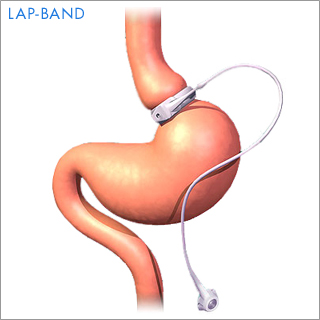Considering Lap Band Surgery? Know Thyself First

You're ready...
Ready to make a significant change in your lifestyle, your health and your well-being.
You're tired...
Tired of trying the latest, the "greatest", the easiest, the fastest...the next "big thing" in weight loss or the tried-and-true that seems to work for everyone BUT you.
You've made the decision to pursue Lap Band surgery and you're on your way. The journey may not be fast - psychological evaluations, requesting a recommendation from your primary care doctor, undergoing pre-op qualifying procedures and perhaps even trying one more time to follow another "diet" plan to satisfy your insurance companies' requirements.
There is a method to all of this madness - a point to all the hoops you need to jump through in order to have this potentially life-saving surgery. You will be asked a LOT of questions - some of them very personal and some of them more difficult than others. While you are undergoing the pre-surgery qualification process, whether it is short or long, I want to encourage you to do one more piece of analysis and introspection: a Personality Assessment.
What does your personality have to do with your potential success as a Lap Band surgery patient? A lot - in fact, some might say that knowing your personality type and how it will affect your interactions with medical and support staff can be one of the critical determining factors for your level of success beyond the surgery.
When I began my journey to qualification for Lap Band surgery in August of 2008, I was fortunate that the process for my employer was not an extremely long one. I needed a referral from my primary care doctor, which was fairly easy to obtain. I needed to prove that I had tried other weight loss methods, which was not difficult, since my most recent experiences in that area included one of the most popular group programs in the country, plus some lesser-known programs that had worked for a short while for me, but did not produce lasting results.
I also had to undergo a psychiatric evaluation to help the practitioner decide if my motivations for the surgery were reasonable and the results I was targeting were achievable. Superficial motivations like a new wardrobe or wanting to date more would not have cut it - and those were not part of my motivation. My main goals were to:
1) Get off of all medication - most notably the high blood pressure and diabetes medications, plus the potential for having another medication added for my recently diagnosed atrial fibrillation.
2) Stop and reverse the pattern of poor health that was present in my family. I had a deep and wide history of health issues in my family, from my mother and father to my older brother and sister, and 3 of my 4 aunts - all suffered with diabetes, high blood pressure and heart disease. I was determined not to add my name to the ranks of those whose cause of death could be traced directly back to those illnesses.
3) Live my healthiest possible life and extend my life expectancy instead of shortening it.
Once I began the qualifying process, I took what I knew of my personality type (I'm a Powerful Choleric) and used that to my advantage. That particular personality type is known for it's positive qualities (dynamic leaders, driven, determined) as well for it's potentially negative qualities (stubborn, opinionated, controlling). Knowing this about myself helped me to prepare for my interactions with medical and support staff, and helped me to "turn down" my normal opinionated personality more toward one that was accepting, cooperative, and open to learning. I did not have to have all the answers anymore, just be able to find and listen to the people who had them.
My personality type served me well during the post-operative recovery period. My natural impatience, tempered with the information I had received and adopted from my surgeon, helped me to have a trouble-free recovery. Being willing to listen, comprehend and apply the knowledge I had made my transition easier. The drive and determination that is part of the Powerful Choleric's personality also drove me to start and stick with an exercise program during my recovery. I, who had never considered that I would run more than a few steps (or to chase down a young child), found myself running a 5k race.
The intentional action of discovering your personality type can also help you in advocating for yourself with medical and support staff. If you are a more laid-back personality - a Peaceful Phlegmatic, for instance - you might be inclined to simply accept what you are told and follow all recommendations to the last detail. That means it's important for you to know that your particular group of medical and support professionals is well-educated and abreast of the latest information so that you can be confident in their instructions and recommendations.
If your personality is more outgoing - a Popular Sanguine, for instance - it will be more important for you to affiliate with a medical and support team that has plenty of opportunity for you to interact with fellow patients, service providers, and others that can help make your Lap Band journey more in harmony with that personality's need for conversation and interaction. This personality type may also require more intensive follow-up and more frequent check-ins with medical and support staff. A more 'hands-off' type of program would not be optimal to ensure this individual's success.
The final personality type we'll discuss in this article is more reserved and introspective - the Perfect Melancholy - and they are more detail-oriented, serious and more inclined to be a perfectionist. This individual may have an easier time following recommendations or a "cookbook" of suggested actions for living a successful life after their procedure. This same quality, when taken to extremes, can cause an individual to become pessimistic and to drive themselves crazy with their efforts to measure up to their own high standards.
If some of these personality traits have made you curious as to which of the personality styles best fits you - realizing that most people are a combination of more than one of these at varying levels - then consider completing a personality assessment and using the information you learn from that to become a more educated patient. Knowing yourself more thoroughly can help you guide and adjust interactions with your medical team and support staff, and help you get the information you need to help you have a successful experience.




mocaba1987 7
Posted
Awesome Post....LOVE IT!!!!!!!!!!!!!
Share this comment
Link to comment
Share on other sites